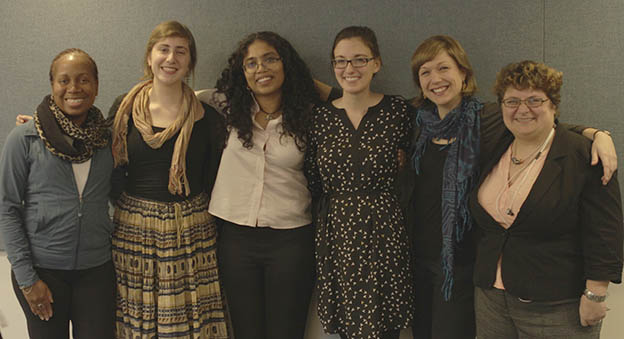McMaster delegation attends Emerging Leaders Global Summit

McMaster was represented at the Emerging Leaders Global Summit by delegates from the Faculties of Engineering, Science and Social Sciences. In total, the group included five early to mid-career faculty members and 11 students.
How can the next generation of women leaders create the future? A delegation of 16 McMaster students and faculty members recently traveled to New York for a global conference that explored answers to that question.
Held at Columbia University, the fifth annual Emerging Leaders Global Summit was presented by the Womensphere Foundation, an organization that promotes the potential of girls and women. More than 350 delegates attended this year’s conference, which focused on how more women can reach the upper echelons of business, science, technology, entrepreneurship, social innovation, philanthropy, media, culture and the arts.
McMaster was represented by delegates from the Faculties of Engineering, Science and Social Sciences. “It was a great opportunity and extremely stimulating,” said Kalaichelvi Saravanamuttu, associate professor of chemistry and chemical biology, who notes the McMaster group included five early to mid-career faculty members, along with 11 students from the undergraduate to postdoctoral levels.
Undergraduate student Christina Vietinghoff co-authored a report for The Silhouette following the conference. “One of the biggest benefits of this experience was the opportunity to network with each other across our disciplines,” she said. “It was really interesting to learn from each other.”
The idea for the trip was initiated by Robert Baker, dean of the Faculty of Science, who saw this as an important opportunity for female members of the McMaster community. “There was a strong component to the conference that explored leadership in academia, especially within the STEM disciplines,” said Baker.
Baker notes the high percentages of female students now enrolled in the sciences at McMaster at both the undergraduate and graduate levels.
“We’re on the right trajectory,” he said, “but we need to strengthen our professoriate with top female candidates. Otherwise, we’ll lose them to other institutions.”
Ayse Turak, assistant professor of engineering physics, applauds McMaster’s efforts in recent years to recruit female candidates to the Faculty of Engineering. “I’m one of the recent hires as a result of those efforts,” she said. “These are the kind of changes that can come about, when you have a commitment from the top.”
The delegation has drafted a report with their findings and suggestions. One recommendation is the creation of a fact-finding mission to record the many initiatives already in place on campus.
One such initiative is the upcoming Current Research in Engineering, Science and Technology (CREST) Meeting , set for March 7 and 8 and organized by McMaster’s Women in Science and Engineering (WISE).
The 2014 Womensphere delegates from McMaster University:
Student delegates: Matilda Backholm (PhD student, Physics), Monika Bialy (Master’s student, Software Engineering), Amanda Fawcett (post-doctoral fellow, Chemical Engineering), Paula Hanebach (undergraduate, Chemical Engineering), Fran Lasowski (PhD student, Chemical Engineering), Mary Kate MacDonald (undergraduate, Integrated Sciences), Christina Pierre (PhD student, Biology), Kasia Pisanski (PhD student, Psychology), Talena Rambarran (PhD student, Chemistry), Lauren Scott (undergraduate, Civil Engineering) and Christina Vietingoff (undergraduate, Political Science).
Faculty delegates: Karen Bird (Political Science), Sarah Dickson (Civil Engineering), Neslihan Dogan (Materials Science and Engineering), Kalai Saravanamuttu (Chemistry and Chemical Biology) and Ayse Turak (Engineering Physics). Juliet Daniel (Biology) was not able to attend the conference, but was actively involved in discussions before and after the conference.
 “The Womensphere delegation (minus photographer Monika Bialy) at Columbia University”
“The Womensphere delegation (minus photographer Monika Bialy) at Columbia University”

